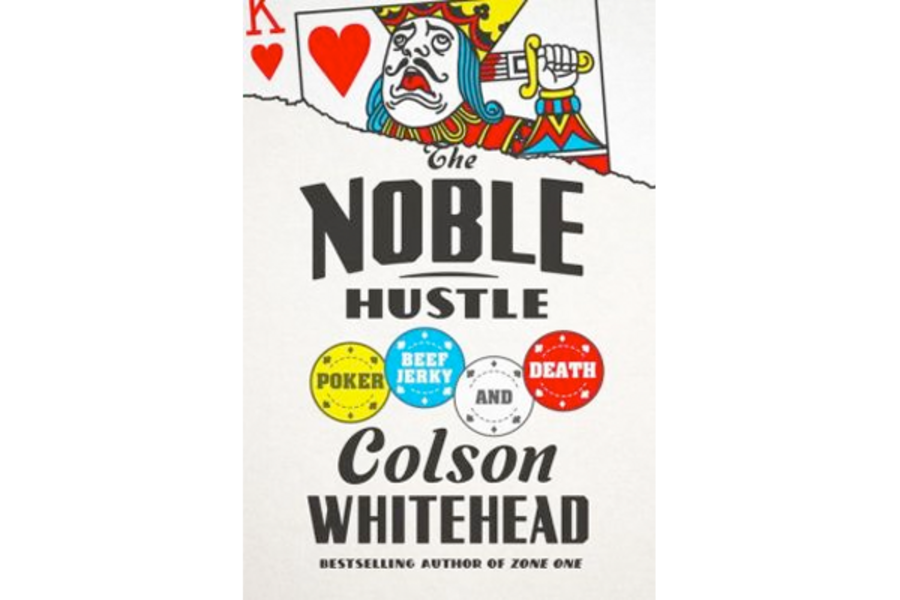The Noble Hustle
Loading...
Even though Colson Whitehead’s poker odyssey, The Noble Hustle, is nonfiction – he really did get paid by an American magazine to be a contestant in the World Series of Poker three years ago – there are plenty of characters. Shuffling cards and dreams in the dimly lit rooms of small-time casinos, where Whitehead does preliminary research, and the WSOP itself, you find characters like Big Mitch, Country Time, the Robotrons, Methy Mike, and let’s not forget Ubiquitous Loquacious Middle Aged White Guys, all of them Whitehead’s somber reincarnations of something like the stock American archetypes that might have time-traveled from Whitman’s “multitudes” to the hotel corridors of Vegas.
Your favorite character might well be the least somber and most formidable poker player in the game – and quite possibly in Whitehead’s life: That’s Coach, or a woman named Helen Ellis. She’s an Alabama-born transplanted Manhattan housewife on the outside, a Six-Handed No-Limit Hold-Em destroyer on the inside. She coaches Whitehead through the WSOP via tweets and texts while cleaning her Manhattan apartment.
“…Coach was cozy at Bronze 61, Brasilia Room,” he writes, observing her in action. “… She wore a black dress with a white collar, pearl bracelet on her wrist. Legs crossed, vivid red nail polish glinting. Her fingers lightly brushed the table, as if she were in a canoe, her hand dipping lazily in the current. If this was her housewife costume, this day she was hosting a dinner party for some swell couples from the planned community. The roast cooling on the rack.” In fact, the woman’s a player, a winner, and her positive feminine energy contrasting with our hero’s misanthropic resignation is one of the most endearing aspects of this book.
But the most interesting pervasive character in "The Noble Hustle" is Whitehead himself. For this journey, he’s our guide, and he recreates himself as a sort of gifted but lazy schmuck from the unfeeling country of Anhedonia (as in anhedonic – incapable of pleasure) who lands himself in interesting places but can’t appreciate it.
“I’m not such a disagreeable companion, am I?” he asks. “Changing the cassettes, drawing my finger across the map to see we’re headed in the right direction. By now I’m that old friend of yours, your [messed] up friend, the one you love dearly and need desperately because he makes you feel better about your own disasters. Stick around for the usual denouement."
While stopping to smell the roses, for Whitehead, may be impossible, providing some meaningful language to wrap around experience is, it seems, inevitable. Whitehead is a habitual user of inventive language. It’s how he makes sense of the world – in this case, the World Series. Of poker. Sometimes that means boiling down complex people and situations to a phrase that puts them devastatingly in their place: “the ‘I tuck my T-shirt into-my jeans without a belt crowd.’” The Ubiquitous Loquacious Middle Aged White Guys.
But other times it elicits something like a poetry of poker. Chips are “tiny slivers chipped off an abstraction, an index of two things: Time and Power.” Cash is carried like that “ever-dwindling currency that always falls through a hole in your pocket: Time.” And my favorite, delivered as a follow-up to a Frank Sinatra quote about why people should drink: “The world is a disease you shake off in the desert.” One word, people: Vegas.
As a successful writer of fiction and nonfiction who has won several high-profile grants and prizes, including a MacArthur “genius” Fellowship, Whitehead has tackled a range of subjects and genres, including a coming-of-age novel, a literary zombie novel, and a collection of essays about New York City. Here, his world is shifted into a tight frame consisting of cards, chips, tables, overpriced, badly-lit restaurants, and variations on a theme of despair. When Whitehead widens the lens a bit to include the world of Coach, or takes us on an interlude chapter that looks back on his first road trip to Vegas, it’s like a breath of fresh air – especially for those of us who don’t speak anhedonic.
As Whitehead nears the end of his WSOP journey, Coach texts him: “GOGOGO! I am glued to this computer rooting for you with the blind structure … in my apron pocket.” Coach’s persistent attempt to rouse her charge to champ status is compared to the combination of Burgess Meredith and Rocky. It’s a combination that awakens even the “half-dead,” poker-faced Whitehead: “I was a player,” he decides, “and I was in this game. I wasn’t depressed, I was curating despair. I wasn’t half dead, but half alive.”
So what happens? What is that “usual denouement” promised by our [messed] up guide? Not winning, or losing, apparently. But perhaps waking and rising to play the game.
Janet Saidi is a Monitor contributor.








